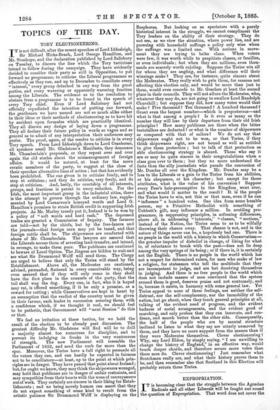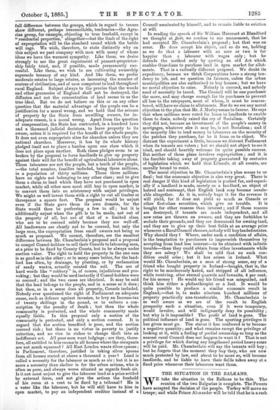EXPROPRIATION.
IT is becoming clear that the struggle between the Agrarian Radicals and all other Liberals will be fought out round the question of Expropriation. That word does not cover the full difference between the groups, which in regard to tenure show different, perhaps irreconcilable, tendencies—the Agra- rian group, for example, objecting to true freehold, except in "residential properties," altogether—but the limit of the right of expropriation will be the standard round which the battle will rage. We wish, therefore, to state distinctly why on this subject we part company with men with many of whose ideas we have the warmest sympathy. Like them, we desire strongly to see the great experiment of peasant-proprietor- ship fairly tried, and, if possible, made permanently suc- cessful. Like them, we wish to see cultivating ownership supersede tenancy of any kind. And like them, we prefer moderate estates to large estates, as increasing the number of centres of civilisation, and of men competent to lead throughout rural England. Subject always to the proviso that the woods and other greeneries of England shall not be destroyed, the diffusion and not the concentration of land seems to us the true ideal. But we do not believe on this or on any other question that the material advantage of the people can be a justification for a moral wrong, and we hold that the seizure of property by the State from unwilling owners, for in- adequate reason, is a moral wrong. Apart from the question of compensation, the State has contracted, in a hundred laws and a thousand judicial decisions, to leave property to its owner, unless it is required for the benefit of the whole people. It does not even expropriate sites for churches unless they are national churches. Moreover, it has by its whole history pledged itself not to place a burden upon one class which it does not place upon another. Both these pledges seem to us broken by the proposal to force landlords to give up property against their will for the benefit of agricultural labourers alone. Those labourers are not the people, but a tenth of the people, —the total number, families included, being three millions, in a population of thirty millions. Those three millions have no rights not belonging to any other class ; and to give them a claim .to land which they have not purchased in open market, while all other men must still buy in open market, is
• to convert them into an aristocracy with unjust privileges. We might as well invest them with a right to cut all timber at threepence a square foot. The proposal would be unjust even if the State gave them its own domain, for the State would then be preferring a few to all ; but it is additionally unjust when the gift is to be made, not out of the property of all, but out of that of a limited class, who are to be coerced solely because they are well-off. All landowners are clearly not to be coerced, but only the large ones, the expropriation from small owners not being so much as proposed. We cannot, therefore, see the smallest difference between Mr. Chamberlain's proposal and a proposal to compel Consol-holders to sell their Consols to labouring men, at a price to be fixed by County Courts, but to be always under auction value. The right to hold the property in the one case is as good as in the other ; or in many cases better, for the land- lord has often, by drainage, by planting, or by reclamation of sandy wastes, actually created the soil. The use of hard words like " robbery " is, of course, injudicious and pro- voking; but they would be used instantly if Consol-holders were so coerced ; and the two cases are identical. It may be said that the land belcngs to the people, and in a. sense so it does ; but then, so in a sense does all property, Consols included. Nobody ever questioned the right of Parliament on adequate cause, such as defence against invasion, to levy an Income-tax of twenty shillings in the pound, or to enforce a con- scription by the penalty of death ; but then the whole community is protected, and the whole community made equally liable. In this proposal only a section of the community is protected, and only a section coerced. It is argued that the section benefited is poor, and the section coerced rich ; but there is no virtue in poverty to justify extortion, and no vice in riches to change theft into an indifferent act. All poor men want lodgings ; are they, there- fore, all entitled to hire rooms in all -houses where the occupants are not much squeezed ? All East London wants silver spoons ; is Parliament, therefore, justified in taking silver spoons from all houses rented at above a thousand a year? Land is called a necessity for the labourer as much as air ; but it is no more a necessity than shelter is for the urban artisan, who is often as poor, and always worse situated as regards fresh air. Is it not most unjust to give the labourer land at a price settled by external force, and not give the artisan the freehold of his room at a rent to be fixed by a tribunal ? He is a voter like the labourer, but he will still have to hire in open market, to pay an independent creditor instead of a Council nominated by himself, and to remain liable to eviction at will.
In reading the speech of Sir William Harcourt at Blandford we thought at first, we confess to our amazement, that he had accepted Mr. Chamberlain's proposal ; but that was an error. He does accept his object, and so do we, holding as we do that a labourer with an acre or two is far happier than a labourer with wages only ; but he defends the method only by quoting an old Act which enables Guardians to purchase land in open market for allot- ments. That is a radically different proposal. We doubt its expediency, because we think Corporations have a strong ten- dency to job, and we question its fairness, unless the urban municipalities are also authorised to buy houses ; but we have no moral objection to raise. Nobody is coerced, and nobody need of necessity be taxed. The Council will be one purchaser the more, and may charge enough for its purchases to prevent all loss to the ratepayers, most of whom, it must be remem- bered, wilkhave no claim to allotments. Nor do we see any moral objection to the plan that Mr. J. Morley seems to favour. He says that when millions were voted for loans to landlords to enable them to drain, nobody raised the cry of Socialism. Certainly they did not, because an investment of the people's money in mortgages, whatever else it may be, is not Socialism ; and if the majority like to lend money to labourers on the security of the patches they purchase, far be it from us to object. We distrust the experiment a little, because we distrust Parliament when its tenants are voters ; but we should not object to see it tried, and should heartily welcome its quite possible success. But neither of these plans involves expropriation ; and it is the forcible taking away of property guaranteed by centuries of legislation which we hold that Liberals, at all events, are morally bound to resist.
The moral objection to Mr. Chamberlain's plan seems to us final; but the economic objection is also very great. There is real danger if this kind of legislation is pushed far, and especi- ally if a landlord is made, merely as a landlord, an object of hatred and contempt, that English land may become unsale- able altogether. As it is, nobody buys it for the revenue it will yield, for it does not yield so much as Console or
other first-class securities, which give no trouble. It is bought for other reasons than interest ; and if those reasons are destroyed, if tenants are made independent, and all new rates are thrown on owners, and they are forbidden to seclude their grounds, and they are denounced for owning land, and they are to give up their best fields at an average price whenever a Rural Council chooses, nobody will buy landed estates. Why should they ? Where, under such a condition of affairs, is the temptation to purchasers to impoverish themselves by accepting from land less interest—to be obtained with infinite trouble—than they could obtain from other investments while they are asleep ? We shall be told that no such con- dition could arise ; but it has arisen in Ireland. What would Mr. Chamberlain, as a man of strong sense, say of a friend who bought property in Ireland—bought, that is, the right to be murderously hated, and stripped of all influence, while receiving, after eternal quarrels and lawsuits, 4 per cent. for his money He would say his friend was misguided, and think him either a philanthropist or a fool. It would be quite possible to produce a similar economic result in England,—that is, to make nineteen hundred millions of property practically non-transferable. Mr. Chamberlain is as well aware as we are of the result to English prosperity such a situation, even if it were temporary, would involve, and will indignantly deny its possibility ; but why is it impossible The profit of land is gone. The political influence of land is gone. The sporting privileges it has given must go. The status it has conferred is to become a negative quantity; and what remains except the privilege of looking at it, with a feeling of partial ownership so long as the nearest rural Council does not happen to want it ? That is not a privilege for which during any lengthened period heavy sums will be paid. Mr. Chamberlain will say the tenants will buy ; but he forgets that the moment they buy they, who are now much protected by law, and about to be more so, will become landlords, and be liable to have their fields taken away at a fixed price whenever their labourers want them.















































 Previous page
Previous page